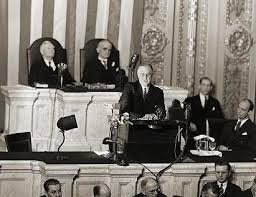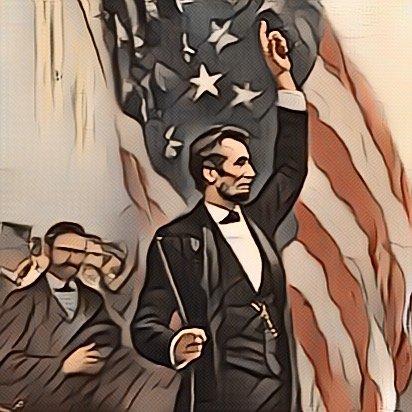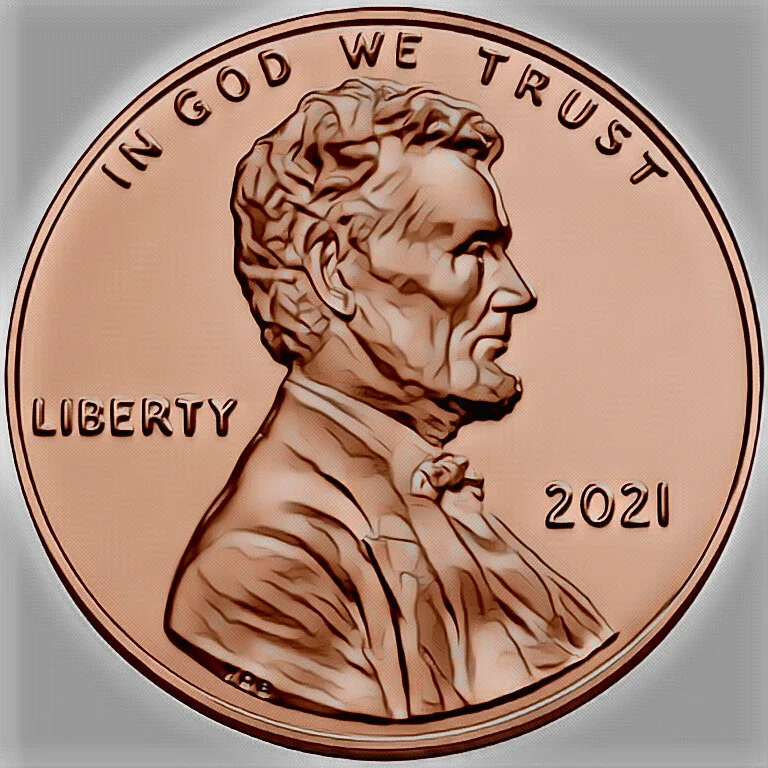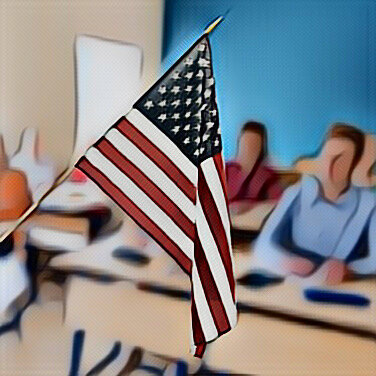
“As you find an idea that suits your needs, I hope that you do not read it to your boys. Take the idea and express it in your own words.”
— Veteran Scouter Victor Reinholz - 1958
2022-27 The Four Freedoms
In his Annual Message to Congress on January 6, 1941, Franklin Roosevelt presented his reasons for American involvement to assist Great Britain during World War II
2017 Scoutmasters minute.
Franklin Roosevelt was elected president for an unprecedented third term in 1940 because at the time the world faced unprecedented danger, instability, and uncertainty. Much of Europe had fallen to the advancing German Army and Great Britain was barely holding its own. A great number of Americans still believed that the United States should continue to stay out of the war, but President Roosevelt understood Britain's need for American support and attempted to convince the American people of the gravity of the situation.
In his Annual Message to Congress (State of the Union Address) on January 6, 1941, Franklin Roosevelt presented his reasons for American involvement, making the case for continued aid to Great Britain and greater production of war industries at home. In helping Britain, President Roosevelt stated, the United States was fighting for the universal freedoms that all people possessed.
Message to Congress - January 6, 1941
In the future days which we seek to make secure, we look forward to a world founded upon four essential human freedoms.
The first is freedom of speech and expression - everywhere in the world.
The second is freedom of every person to worship God in his own way - everywhere in the world.
The third is freedom from want - which translated into world terms means economic understanding which will secure to to every nation a healthy peacetime life for its inhabitants everywhere in the world.
The fourth is freedom from fear - which translated into world terms means a worldwide reduction of armaments to such a point and in such a thorough fashion that no nation will be in a position to commit an act of physical aggression against any neighbor - anywhere.
- Franklin D. Roosevelt
2022-17 Gettysburg Address
4 Scores and 7 Years Ago...
This episode is from my late father's files for a podcast he was creating but never published entitled "Byte of History". This episode is about President Lincoln and the Gettysburg Address.
This week marks 6 months since an amazing scouter passed away, my father. In addition to being the greatest man and father anyone could ask for, he was also a patriot. Dad worked in broadcasting for many years and as I was going through some of his personal items after his death, I came across a podcast that he was creating but never published. The name he had planned for it was “Byte of History” where he would have a weekly topic on American history. This week’s Scouter’s minute, we share with you one of the completed episodes of “Byte of History” entitled, Gettysburg Address. I hope you enjoy it.
4 score and 7 years ago I would bet that 99% of people listening know exactly where that sentence comes from and who said it. It was Thursday November 19th, 1863. It had been four and a half months since the Union Army had won the Battle of Gettysburg. Now who knows what four scores and seven years are? The meaning of this speech is that it had been 87 years since the Declaration of Independence.
Controversy surrounds this speech. Up to 5 possible manuscripts along with a number of reprinted speeches in newspapers have different wording. It is also not clear where the platform actually was as President Lincoln delivered his speech. However one thing was very clear, President Lincoln was there for the dedication of the soldiers National Cemetery at Gettysburg.
The Battle of Gettysburg lasted from July 1st through July 3rd 1863. Resulting in the fatalities of 7058 men, 3155 Union Soldiers, 3903 Confederate. Many more wounded or captured. Even while the dedication of the cemetery was happening men were still burying soldiers. The recovery and burial started in 1863 for burial in the soldiers National Cemetery. The last known remains from the Battle of Gettysburg were found on March 9th 1996. Even today it is suspected that remnants still lie in the fields around Gettysburg.
President Lincoln in his group of officials traveled from Washington DC to Gettysburg on November 18th. Accompanying the president were William Seward, John Usher, and Montgomery Blair. All members of his cabinet. Several foreign officials along with his secretary John Nicholas, and his assistant secretary John Hay, accompanied him.
The presentation at Gettysburg was to be simple. They started with a musical selection and the Reverend T.H. Stockton said an opening prayer. Then another musical selection, this time offered by the Marine band. Then Edward Everett gave the oration of the battles of Gettysburg. Now if Mr. Everett's oration was in keeping with the day, we would find it to be very long. His oration lasted 2 hours. The talk had 13607 words in it and of course many of us today have no idea what was in his oration. After Mr Everett's oration, another hymn was sung. It was then that the dedicatory remarks by the President of the United States, Abraham Lincoln were made.
While traveling to Gettysburg on the 18th, the President had told his assistant secretary, John Hay, that he felt weak. On the morning of the 19th he remarked to his secretary, Mr Nikolai, that he felt dizzy. Mr Hayden noted that during the speech Mr. Lincoln's face had a gastly color and that he looked sad, mournful, almost haggard. When Lincoln boarded the train at 6:30 p.m. that evening he was feverish and weak with a severe headache. After returning to Washington DC President Lincoln was diagnosed with a case of smallpox. It does seem highly likely that President Lincoln delivered the Gettysburg Address while becoming ill with the case of smallpox.
After Mr everette's address President Lincoln only spoke for a few minutes. He summarized his view of the war in just ten sentences. President John F Kennedy once said, “the ground on which we stand shuttered under the clash of arms and was consecrated for all time by the blood of many soldiers.” Abraham Lincoln, in dedicating this great battlefield, expressed in words so eloquent why this sacrifice was necessary.
US Senator Charles Sumner wrote of the address after President Lincoln's assassination in 1865. He said, “that speech uttered at the field of Gettysburg and now sanctified by the martyrdom of its author is a monumental act.” In the modesty of his nature Mister Lincoln said, “the world would little note nor remember what we say here. But it can never forget what they did here.” He was mistaken. The world has taken note of what he said and will never cease to remember it.
***
Four score and seven years ago our fathers brought forth on this continent, a new nation, conceived in Liberty, and dedicated to the proposition that all men are created equal.
Now we are engaged in a great civil war, testing whether that nation, or any nation so conceived and so dedicated, can long endure. We are met on a great battle-field of that war. We have come to dedicate a portion of that field, as a final resting place for those who here gave their lives that that nation might live. It is altogether fitting and proper that we should do this.
But, in a larger sense, we can not dedicate -- we can not consecrate -- we can not hallow -- this ground. The brave men, living and dead, who struggled here, have consecrated it, far above our poor power to add or detract. The world will little note, nor long remember what we say here, but it can never forget what they did here. It is for us the living, rather, to be dedicated here to the unfinished work which they who fought here have thus far so nobly advanced. It is rather for us to be here dedicated to the great task remaining before us -- that from these honored dead we take increased devotion to that cause for which they gave the last full measure of devotion -- that we here highly resolve that these dead shall not have died in vain -- that this nation, under God, shall have a new birth of freedom -- and that government of the people, by the people, for the people, shall not perish from the earth.
Abraham Lincoln
November 19, 1863
2021-27 The Right Key
But, when “the dawn’s early light” came, and the smoke cleared, he saw the American Flag still standing strong.
Imagine, if you will, the sounds of burning buildings…. The blasts from cannons hurling massive steel balls through the air that eventually come back down and destroy whatever is in their way… The yells and screaming of those who are on the front line of the fight. Now imagine the black smoke filling the sky. Black smoke that is billowing out from the White House, the Capitol Building, and the Library of Congress. This was the case in August of 1812.
After the British troops were finished with their invasion on Washington D.C., they turned their sites onto their next target. Fort McHenry in Baltimore. Francis Scott Key received word that his friend, Dr. William Beanes, had been taken prisoner by the British on one of their ships off the coast of Baltimore. In an effort to negotiate the release of his friend, Francis Scott Key found himself also stuck on the same ship 8 miles off the coast from Fort McHenry as both he and Beanes were not allowed to leave until the battle against the Fort was over as they both now had knowledge of the attack the British had planned against Fort McHenry..
With a front row seat of the battle. Francis Scott Key watched as the British fired upon the Fort. “It seemed as though mother earth had opened and was vomiting shot and shell in a sheet of fire and brimstone.” The battle raged all night as red was erupting in the sky. Key was sure that all would be lost for the Fort as the scale of the battle was highly in favor of the British. But, when “the dawn’s early light” came, and the smoke cleared, he saw the American Flag still standing strong.
While still being held captive on the ship, Key wrote his thoughts on paper. His brother-in-law who was a commander of a militia at Fort McHenry, read Key’s work and had it distributed under the name “Defense of Fort M’Henry”. The newspapers soon found out and it was eventually printed throughout the country. Today, we call this piece of work “The Star-Spangled Banner”.
The Star-Spangled Banner
O say can you see, by the dawn’s early light,
What so proudly we hail’d at the twilight’s last gleaming,
Whose broad stripes and bright stars through the perilous fight
O’er the ramparts we watch’d were so gallantly streaming?
And the rocket’s red glare, the bombs bursting in air,
Gave proof through the night that our flag was still there,
O say does that star-spangled banner yet wave
O’er the land of the free and the home of the brave?
2021-06 In God We Trust
Powerful and strong words on one of the humblest measurements of money.
This Sunday is Scout Sunday and throughout the nation scouts and scouters are practicing the 12th point of the Scout Law, reverent. Although the official date for Scout Sunday is the Sunday before BSA’s birthday on February 8th, your troop or pack can celebrate Scout Sunday, Scout Sabbath, or Scout Jumuah throughout this month.
If you have a penny, take it out of your pocket and let's take a look at it. What do you find on it? That’s right. On the front of it we can find President Abraham Lincoln, to the left of him is the word “Liberty”, and above his head we can read “In God We Trust”. Not only as individuals, but as a nation, too, we are committed to live and work in harmony with God, and with his plan.
During the month of February we celebrate some of the great men who influence us. George Washington and Abraham Lincoln who’s birthdays we celebrate on President’s Day and Baden-Powell’s birthday.
These men had many things in common. Love of the outdoors. Human kindness and love of people. And an earnest duty to God and helping to work out a better world. Each one of these men often acknowledged their dependence on God.
Now let's take a look at that penny again. It’s only worth one cent. It’s the smallest amount of money that you can carry in your pocket. But, how amazingly powerful and strong are the words that it bears, “In God We Trust”.
2020-32 Chirp, Chirp, Chirp
We’re waiting for the chirp, chirp, chirp of an eaglet being born.
This last week our troop had an amazing event happen… we had our first Eagle! This did not happen overnight but has been in the scouting incubator for 7 years.
I’m reminded of a scene in one of my favorite musicals, 1776. We have John Adams, Benjamin Franklin, and Thomas Jefferson sitting on the steps of Independence Hall in Philadelphia waiting for the chirp, chirp, chirp of an eaglet being born while playing midwives to an egg. They have just completed putting the declaration of independence on paper and are debating on which bird will represent our nation. The eagle, the dove, or… the turkey. We see Benjamin Franklin voice his opinion towards the turkey while calling the eagle a scavenger, thief, and coward. Franklin eventually comes around to agree on the Eagle with the other two.
Tonight, we awarded you with the hours and hours of work that you, your family, your friends, and your leaders have completed along your trail to eagle. Adding a little here and a little there to your egg. And tonight, you hatched and become an Eaglet. As a newly hatched Eaglet, there is still a lot that will need to be completed as you mature into a full-grown Eagle. Take a look at those who have been invited to sit within the Eagles Nest, there is quite a few of them that are balding, or are Bald Eagles. The journey does not end when you receive this award but continues with you through all the days of your life while you interact and work with others around you.
Throughout your life, continue to do your best, do your duty to God and your county, always help others, stay physically strong, mentally awake, and morally straight. Keep the 12 points of the scout law in your back pocket. At home, school, or work; be trustworthy, loyal, helpful, friendly, courteous, kind, obedient, cheerful, thrifty, brave, clean, and reverent.
2020-27 Stitched Together
I think that all those stitches represent us--”we, the people”--that every one of us is represented in the flag by a stitch holding the flag together.
Did you ever think of just what makes up our country’s flag? Yes, there are stripes, a patch of blue, and some five-pointed stars--but they are just pieces of cloth.
However, when the 13 stripes of alternate red and white, representing the thirteen original states, are put together and the field of blue is in place with the stars, representing the “constellation” of 50 states--all securely held together by thousands of stitches--then we no longer have pieces of cloth and patches, but the flag of the United Sates, the emblem of our country.
I think that all those stitches represent us--”we, the people”--that every one of us is represented in the flag by a stitch holding the flag together. And as long as we are strong, holding steadfastly to our job of being good American citizens, our country will remain “one nation under God, indivisible, with liberty and justice for all.”
All of you know what would happen to a flag if some of the stitches failed to hold. The flag would fall apart or unravel. That is exactly what can happen to our country if we do not try to be good Americans. Our America can lose its “Oneness.”
Let’s say, “We will not let that happen.” We will all of us, on this day and every day, continue to do our best, to help others, and to show by our actions that we are worthy of our country.
2020-24 I Am Your Flag
"Old Glory" is my nickname, and proudly I wave on high.
I am your Flag.
I was born on June 14th, 1777.
I am more than just cloth shaped into design.
I am the refuge of the World's oppressed people.
I am the silent sentinel of Freedom.
I am the emblem of the greatest sovereign nation on earth.
I am the inspiration for which American Patriots gave their lives and fortunes.
I have led your sons into battle from Valley Forge to the bloody swamps of Vietnam.
I walk in silence with each of your Honored Dead, to their final resting place beneath the silent White Crosses, row upon row.
I have flown through Peace and War, Strife and Prosperity, and amidst it all I have been respected.
My Red Stripes....symbolize the blood spilled in defense of this glorious nation.
My White Stripes....signify the burning tears shed by Americans who lost their sons.
My Blue Field....is indicative of God's heaven under which I fly.
My Stars....clustered together, unify 50 states as one, for God and Country.
"Old Glory" is my nickname, and proudly I wave on high.
Honor me, respect me, defend me with your lives and fortunes.
Never let my enemies tear down from my lofty position, lest I never return.
Keep alight the fires of patriotism, strive earnestly for the spirit of democracy.
Worship Eternal God and keep His Commandments, and I shall remain the bulwark of peace and freedom for all mankind.
I am your Flag.
2020-16 Red Skelton - Pledge of Allegiance
In 1969, Red Skelton gave his personal view of the Pledge of Allegiance.
When I was in elementary school I can remember reciting the Pledge of Allegiance every morning. The small American Flag was usually posted on the wall up by the clock in the school room. Some teachers would even give us students the opportunity to lead the Pledge through a rotation during the month. I can still recall how proud I was on den meeting days when I would wear my Cub Scout uniform to school and salute the Flag in the morning rather than placing my hand over my heart. In fifth grade we graduated to being the students that would raise our Flag on the outdoor flagpole in front of the school each morning.
I learned how to respect the Flag and the Pledge of Allegiance from my teachers, but most importantly I learned it from my family. Both of my Grandpas served in World War II. They risked their lives to protect our freedoms that the Flag stands for. I was blessed to have a Mom who was the best den leader and committee chair and a Dad who was the best cubmaster that pack 305 has ever had. Their love and respect for the Pledge of Allegiance and our great Flag rubbed off on me.
One of my Dad’s favorite comedians is Red Skelton. So many times as a youth, I walked around the corner of the kitchen to find Dad on his recliner laughing at the Red Skelton show. In one episode in 1969, Red Skelton gave his personal view of the Pledge of Allegiance. Red’s “Pledge” was twice read into the Congressional Record of the United States and received numerous awards.
Here is: Red Skelton - What the Pledge Means to ME.
Original broadcast date: January 14, 1969
From the Red Skelton Hour, CBS TV
COPYRIGHT 1969 RICHARD RED SKELTON
I remember this one teacher. To me, he was the greatest teacher, a real sage of my time.
He had such wisdom. We were all reciting the Pledge of Allegiance one day, and he walked over.
Mr. Lasswell was his name.
He said, "I've been listening to you boys and girls recite the Pledge of Allegiance all semester, and it seems as though it is becoming monotonous to you.
If I may, may I recite it and try to explain to you the meaning of each word?"
I: me, an individual, a committee of one.
PLEDGE: dedicate all of my worldly goods to give without self-pity.
ALLEGIANCE: my love and my devotion.
TO THE FLAG: our standard, Old Glory, a symbol of freedom.
Wherever she waves, there is respect because your loyalty has given her a dignity that shouts freedom is everybody's job.
OF THE
UNITED: that means that we have all come together.
STATES: individual communities that have united into 48 great states.
Forty-eight individual communities with pride and dignity and purpose, all divided with imaginary boundaries yet united to a common purpose, and that's love for country.
OF AMERICA
AND TO THE REPUBLIC: a state in which sovereign power is vested in representatives chosen by the people to govern. And government is the people and it's from the people to the leaders, not from the leaders to the people.
FOR WHICH IT STANDS
ONE NATION: meaning, so blessed by God.
INDIVISIBLE: incapable of being divided.
WITH LIBERTY: which is freedom, the right of power to live one's own life without threats, fear, or some sort of retaliation.
AND JUSTICE: the principle or quality of dealing fairly with others.
FOR ALL: which means, boys and girls, it's as much your country as it is mine.
Since I was a small boy, two states have been added to our country and two words have been added to the Pledge of Allegiance: UNDER GOD
Wouldn't it be a pity if someone said, "That is a prayer," and that would be eliminated from schools, too?















